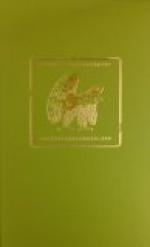“Yes, I blame her.” Miss Armitage began to walk on towards the edge of the bench. “I blame her, but not as you do. I know she tried to do right; she would have gone to Alaska—if David had wished it—at the start. And she’s been courageous, too. She’s smiled—laughed in the face of defeat. Her closest friends never knew.”
“You defend her. I wonder at that.” Tisdale passed her and turned to offer his help down the first abrupt pitch. “How you, who are the one to censure her the most, can speak for her always, as you do. But there you are like Weatherbee. It was his way to take the losing side; champion the absent.”
“And there is where your resemblance stops,” she answered quickly. “He lacked your streak of iron. Of course you know about your strange likeness to him, Mr. Tisdale. It is so very marked; almost a dual personality. It isn’t height and breadth of shoulder alone; it’s in the carriage, the turn of the head; and it creeps into your eyes sometimes; it gets into your voice. The first time I saw you, it was startling.”
Tisdale moved on, picking up the trail they had made in ascending; the humor began to play reminiscently at the corners of his mouth. “Yes, I know about that resemblance. When we were on the Tanana, it was ’Tisdale’s Twin’ and ‘Dave’s Double.’ A man has to take a name that fits up there, and we seemed to grow more alike every day. But that often happens when two friends who are accustomed to think in the same channels are brought into continual touch, and the first year we spent in the north together we were alone for weeks at a stretch, with no other human intercourse, not a prospector’s camp within a hundred miles. The most incompatible partners, under those circumstances, will pick up subconsciously tricks of speech and gesture. Still, looking back, I see it was I who changed. I had to live up to Weatherbee; justify his faith in me.”
Miss Armitage shook her head slowly. “That is hard to believe. Whoever tried to mould you would feel through the surface that streak of iron.” They had come to another precipitous place, and Tisdale turned again to give her the support of his hand. The position brought his face on a level with hers, and involuntarily she stopped. “But whatever you may say, Mr. Tisdale,” she went on, and as her palm rested in his the words gathered the weight of a pact, “whatever may—happen—I shall never forget your greatness to-day.” She sprang down beside him, and drew away her hand and looked back to the summit they had left. “Still, tell me this,” she said with a swift breathlessness. “If it had been David Weatherbee’s wife up there with you when the thunderbolt struck, would it have made a difference? I mean, would you have left her to escape—or not—as she could?”




